Perspective
Perspective

More Posts from Ritasakano and Others






Hitachi Seaside Park, Japan.
Paisagens do Japão, estar aqui é muito bom!!

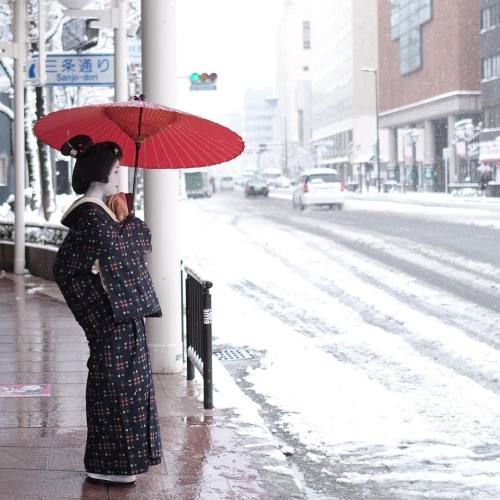
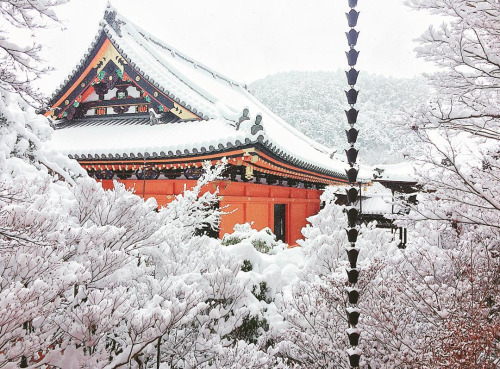

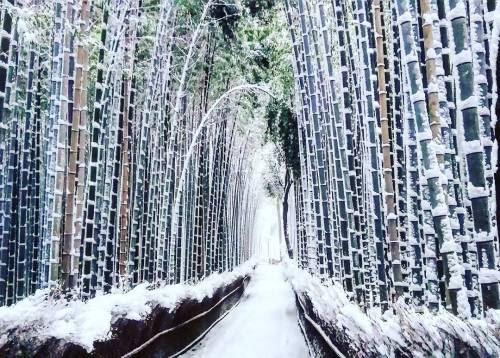

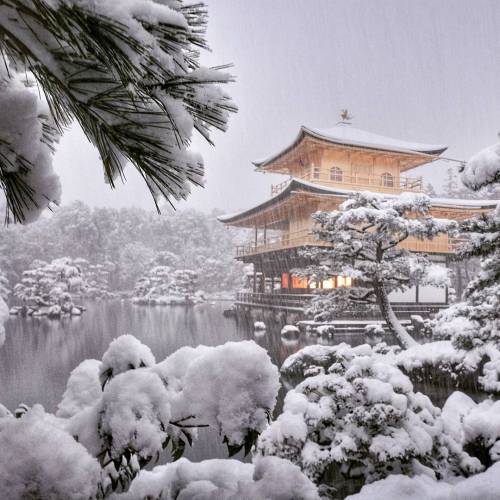
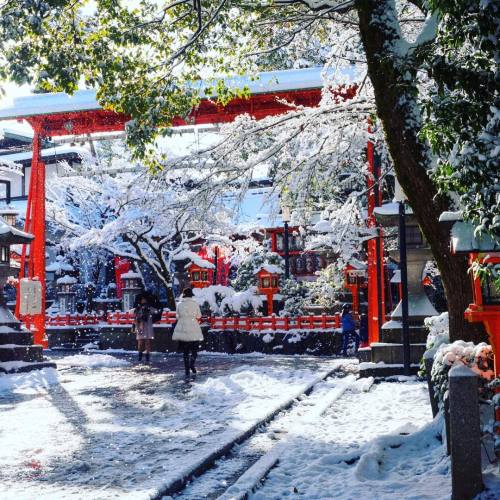


Heavy Snowfall in Kyoto Turns the City Into a Beautiful Winter Wonderland

This image was taken by the NASA/ESA Hubble Space Telescope’s Advanced Camera for Surveys (ACS) and shows a starburst galaxy named MCG+07-33-027. This galaxy lies some 300 million light-years away from us, and is currently experiencing an extraordinarily high rate of star formation — a starburst.
Normal galaxies produce only a couple of new stars per year, but starburst galaxies can produce a hundred times more than that. As MCG+07-33-027 is seen face-on, the galaxy’s spiral arms and the bright star-forming regions within them are clearly visible and easy for astronomers to study.
In order to form newborn stars, the parent galaxy has to hold a large reservoir of gas, which is slowly depleted to spawn stars over time. For galaxies in a state of starburst, this intense period of star formation has to be triggered somehow — often this happens due to a collision with another galaxy. MCG+07-33-027, however, is special; while many galaxies are located within a large cluster of galaxies, MCG+07-33-027 is a field galaxy, which means it is rather isolated. Thus, the triggering of the starburst was most likely not due to a collision with a neighboring or passing galaxy and astronomers are still speculating about the cause. The bright object to the right of the galaxy is a foreground star in our own galaxy.
Object Names: MCG+07-33-027
Image credit: ESA/Hubble & NASA and N. Grogin (STScI)
Text credit: European Space Agency
Time And Space
Kyoto e seus encantos.

Classic Kyoto by Peter Stewart
Muito bom!!
Celebrate Today’s Solar Eclipse With NASA
Today, Aug. 21, the Moon’s shadow is sweeping across North America. People across the continent have the chance to see a partial solar eclipse if skies are clear.

For those within the narrow path of totality, stretching from Oregon to South Carolina, that partial eclipse will become total for a few brief moments.

Make sure you’re using proper solar filters (not sunglasses) or an indirect viewing method if you plan to watch the eclipse in person.

Wherever you are, you can also watch today’s eclipse online with us at nasa.gov/eclipselive. Starting at noon ET, our show will feature views from our research aircraft, high-altitude balloons, satellites and specially-modified telescopes, as well as live reports from cities across the country and the International Space Station.
Learn all about today’s eclipse at eclipse2017.nasa.gov.
Make sure to follow us on Tumblr for your regular dose of space: http://nasa.tumblr.com



Shibori kimono. Taisho period (1912-1926), Japan. The Kimono Gallery. A silk shibori kimono featuring large ‘yabane’ (arrow-feather) motifs of shibori with silk and metallic thread embroidery highlights. This kimono is patterned entirely in fine shibori (tie-die). The arrow feather (yabane) motif first became fashionable in Japan as early as the Heian era – initially with martial connotations – and during the Edo era it was often used on kimono for ladies in waiting. The motif was very popular on schoolgirl and teacher kasuri (ikat) kimonos of the mid to late Meiji period. During the Taisho and early Showa periods the yabane was a popular woman’s kimono motif, created via shibori, stenciling, or yuzen-dyeing. The arrow-feather motifs were most often vertical, but sometimes created at an angle, as in this example. The Yabane pattern, like most geometric motifs, is all-season, however, it has an auspicious association with weddings – like an arrow shot from a bow a bride does not return to her parents’ house. This kimono would have been very expensive to create - the shibori work itself would have taken a few months to complete. The white silk embroidery on the two arrow-feather motifs situated on lower left of the kimono is very visible from a distance, and provides a tasteful change from the other plainer motifs. The motifs are randomly scattered throughout the kimono 'canvas’, resulting in a casual relaxed atmosphere. The “speckled” appearance of the yellow background color is an accomplished effect: many thousands of tie-dye knots were once placed here to be able to achieve the slightly puckered yellow dots on black background speckled look.

Meu canto
-
 aglaydis liked this · 3 years ago
aglaydis liked this · 3 years ago -
 ltd68 liked this · 6 years ago
ltd68 liked this · 6 years ago -
 daemondamian liked this · 6 years ago
daemondamian liked this · 6 years ago -
 simplygreenie liked this · 6 years ago
simplygreenie liked this · 6 years ago -
 spookyking reblogged this · 6 years ago
spookyking reblogged this · 6 years ago -
 spookyking liked this · 6 years ago
spookyking liked this · 6 years ago -
 i-will-remove-my-pants liked this · 6 years ago
i-will-remove-my-pants liked this · 6 years ago -
 peacefulrestvalley liked this · 6 years ago
peacefulrestvalley liked this · 6 years ago -
 niftyandinterestingstuff reblogged this · 6 years ago
niftyandinterestingstuff reblogged this · 6 years ago -
 niftyandinterestingstuff liked this · 6 years ago
niftyandinterestingstuff liked this · 6 years ago -
 fenrissama liked this · 6 years ago
fenrissama liked this · 6 years ago -
 ankinskywalker liked this · 6 years ago
ankinskywalker liked this · 6 years ago -
 cuteloonyinlove reblogged this · 6 years ago
cuteloonyinlove reblogged this · 6 years ago -
 cuteloonyinlove liked this · 6 years ago
cuteloonyinlove liked this · 6 years ago -
 gabosaurius reblogged this · 6 years ago
gabosaurius reblogged this · 6 years ago -
 gabosaurius liked this · 6 years ago
gabosaurius liked this · 6 years ago -
 beache-96 reblogged this · 6 years ago
beache-96 reblogged this · 6 years ago -
 vennitrii liked this · 6 years ago
vennitrii liked this · 6 years ago -
 outerspacehippiehay reblogged this · 6 years ago
outerspacehippiehay reblogged this · 6 years ago -
 outerspacehippiehay liked this · 6 years ago
outerspacehippiehay liked this · 6 years ago -
 ssimsass liked this · 6 years ago
ssimsass liked this · 6 years ago -
 elda-ru liked this · 6 years ago
elda-ru liked this · 6 years ago -
 thatsnotyourpurse liked this · 6 years ago
thatsnotyourpurse liked this · 6 years ago -
 bi6money reblogged this · 6 years ago
bi6money reblogged this · 6 years ago -
 the-fae-folk liked this · 6 years ago
the-fae-folk liked this · 6 years ago -
 cowboygiovanni liked this · 6 years ago
cowboygiovanni liked this · 6 years ago -
 zeeseventeen reblogged this · 6 years ago
zeeseventeen reblogged this · 6 years ago -
 justcallgabe reblogged this · 6 years ago
justcallgabe reblogged this · 6 years ago -
 ytelovski reblogged this · 6 years ago
ytelovski reblogged this · 6 years ago -
 ytelovski liked this · 6 years ago
ytelovski liked this · 6 years ago -
 sharkspaceengine liked this · 6 years ago
sharkspaceengine liked this · 6 years ago -
 entropikuro liked this · 6 years ago
entropikuro liked this · 6 years ago -
 justcallgabe liked this · 6 years ago
justcallgabe liked this · 6 years ago -
 frank-llyn reblogged this · 6 years ago
frank-llyn reblogged this · 6 years ago -
 frank-llyn liked this · 6 years ago
frank-llyn liked this · 6 years ago